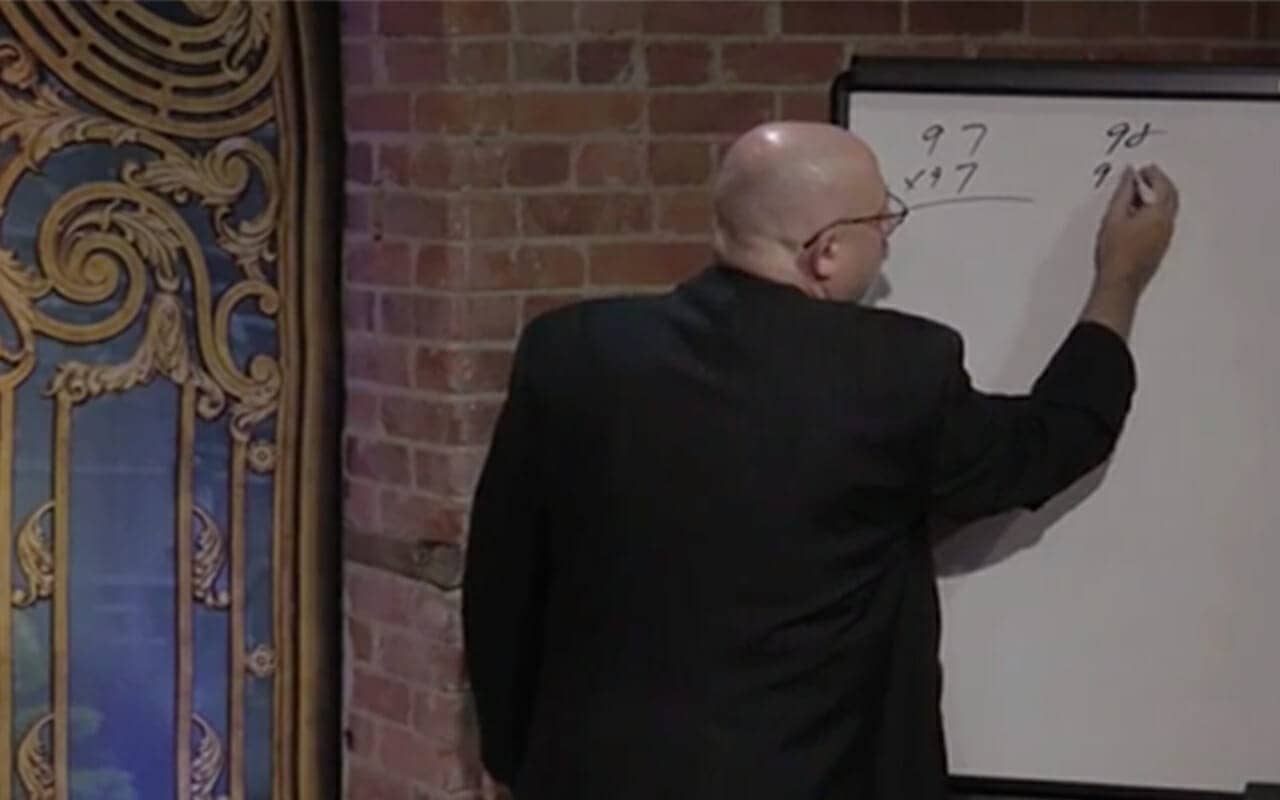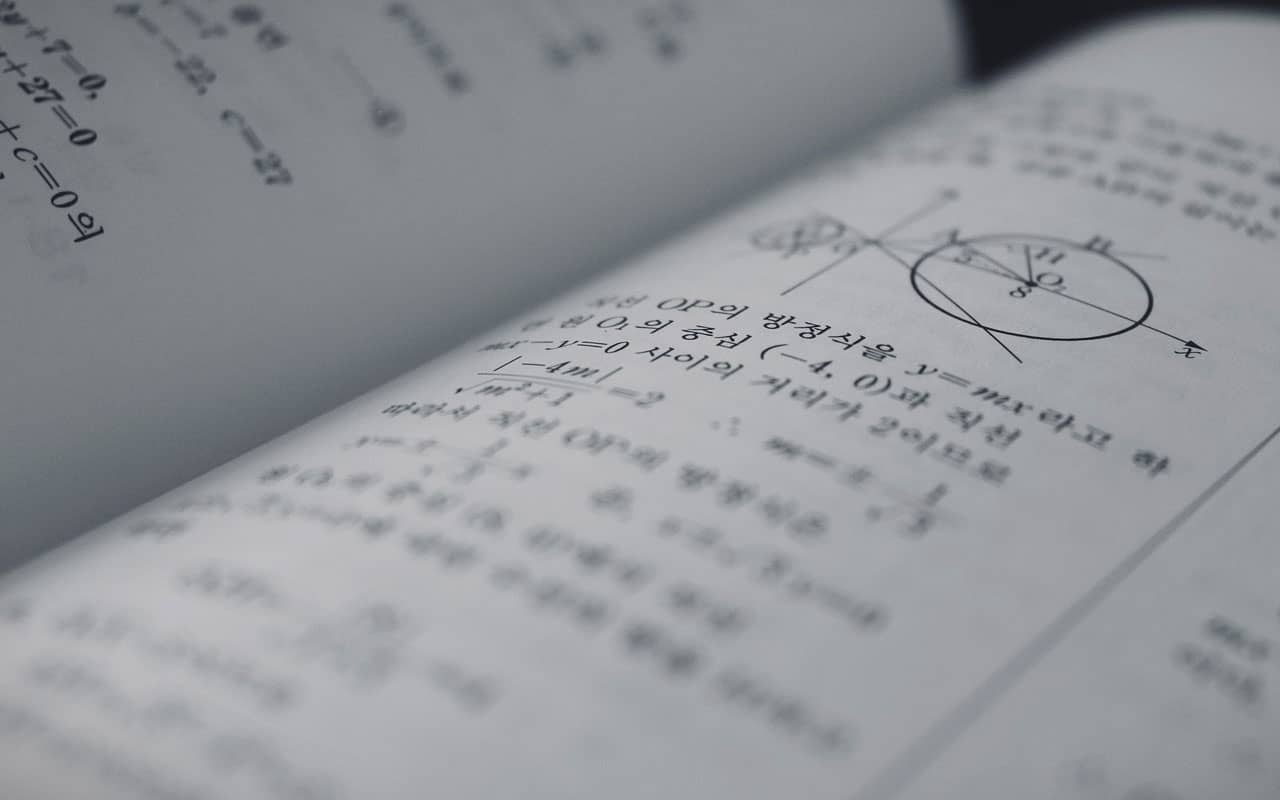 Can anyone really become a human calculator?
Can anyone really become a human calculator?
Yes, and as renowned skeptic Michael Shermer wrote in the introduction to Secrets of Mental Math, “mathemagic” is unusual for two reasons.
First, you don’t have to be skeptical. Anyone really can become a mental calcultor.
Second, Shermer points out that unlike magicians who usually hide their secrets, people who perform rapid mental calculation demonstrations are different. They love to share their techniques with you.
And on this page, we’ll take a deep dive into what mental calculation is and how you can perform the exact same feats yourself.
It’s not rocket science, but it helps if you can remember the tactics and formulas.
And since this is a memory improvement site, I’ll help you with that aspect too.
Ready?
Let’s dive in!
What Is A Mental Calculator?
According to Guinness record holder Scott Flansburg, the secret to numbers is to use your brain as a calculator. In other words, you can correctly solve math problems without using any external aid. No pen, no paper and definitely no abacus or calculator.
As he explains in this television interview, most people don’t really know math. They’ve just memorized the multiplication table.
But if you want to know how to be a mental calculator, you’ve got to stop relying on memory.
We’ll cast some doubt on the idea that you have to stop using your memory, but overall, Flansburg is right. To mentally calculate, you literally have to become a person who calculates.
And that comes down to understanding some fundamental rules. In fact, you might already have access to Flansburg’s lessons if you have the same version of this “speed reading” course that I do. In my version, there’s a course with him called “Crash Math.”
Flansburg talks fast, but one of the key lessons I took away from his course is simple:
To become a mental calculator, you need to start by doing three things:
- Observe numbers
- Get curious about what you observe
- Use reflective thinking about the nature of numbers
You might also note, that like Jill Price, the woman who claims to have photographic memory, Flansburg brings a lot of focus to observing and reflecting on the nature of numbers.
As Flansburg says, “ask your brain a better question and you’ll get a better answer.” So in sum, a mental calculator is ultimately someone who perceives patterns and then asks better questions about those patterns.
One of the exercises he gives is to literally pay attention to numbers on road signs. Add them up and then reduce them to nine. “This is logical thinking and checking of mathematical facts,” he says. And, he claims (I believe correctly) that doing such exercises strengthens your brain.
Do “Human Calculators” Really Exist?
In a word, yes. In addition to Flansburg, Arthur Benjamin is the author of Secrets of Mental Math. He’s a professor and has a PhD from Johns Hopkins University.
What makes Benjamin so great is that he shares some tidbits of the history of mental calculation, mentioning people like Zerah Colburn.
Then there’s Sal Piacente. In his Penguin Live lecture, he shares exactly how he solves square root problems at lightning fast speeds. One of his shows was inspired by his friendship with Kim Peek, who was the inspiration for the movie, Rain Man.

In the memory improvement world, there’s Dominic O’Brien. In some of his books, he shares his mental calculation techniques for determining the exact weekdays based on any historical date. He also created the Dominic System, which helps you memorize any number or sequence of digits.
Harry Lorayne also wrote Miracle Math: How to Develop a Calculator in Your Head.
Some of these people use the Trachtenberg Method or something like it. Others use the Memory Palace technique for math.
All of these people have definitely observed and reflected on numbers as Flansburg instructs. However, unlike Flansburg, who says that you have to calculate and not memorize, many people have indeed memorized formulas that help with speed math.
So let’s turn now to look at some of these specifics and give you some exercises.
9 Mental Math Tricks to Become a Human Calculator
The main trick common to human calculators is that they know something about the different kinds of calculations they might be called upon to do.
And in most demonstrations, I’ve noticed that they’re the ones who determine exactly what kinds of calculations they’re going to perform.
This observation suggests that they might not be masters of all math, but just the parts where it’s possible to derive outcomes using formulas they’ve committed to memory. Here’s where I think Scott Flansburg contradicts himself a little. He says that you need to calculate, not memorize only to tell you a bunch of rules that need to be memorized.
He even gives you a number rhyme to help you remember one of the key principles: “If I get nine, that means everything’s fine.”
So with the requirement that you do have to remember things in order to use the mental math tricks, let’s dig in.
Trick One: Learn The Trachtenberg Method
It’s really important to study what other mental calculators know about. I teach you the Trachtenberg Method (sometimes called Trachtenberg System) in this mental math tutorial.
Trick Two: Break Numbers Down
It’s really important to break numbers down so they’re more manageable. The need for smaller numbers has to do with how the brain chunks information.
In other words, instead of trying to add 57 to 29, break it down. Add 20 to 57 to get 77 first. Then add 9 to get 86.
Even if this feels like you’re adding an additional step, remember: You’re a mental calculator. You will be a lot faster when you separate the numbers like this.
Trick Three: Estimation and Rounding
Arthur Benjamin gives a ton of estimation exercises in his book. To take a simple example, instead of trying to multiply 49 by 6, you can round it up to 50. This gives you a much clearer and faster path to an estimated answer which you then correct by adding 9 multiplied by 6.
Estimation and rounding are very important when you’re using a Mnemonica stack or other memdeck as well (if you’ve that realm of multiple mentality to your cognitive training routine).
Trick Four: Observe and Use Patterns
Many mathematical formulas involve patterns, particularly based on repetition.
Multiples of 9, for example, involve a pattern where digits in the answer add up to 9. If you calculate 9 times 7, you get 63. 6 plus 3 equals nine. There are many other patterns like this, so if you want to be a “mathlete” start to observe and commit them to memory.
Likewise in the cube roots, you find patterns like, “if the perfect cube ends in 0, the cube root of it must end in 0.” This pattern repeats all the way up to nine.
Trick Five: Memorize Important Numbers
Knowing your square roots, the most common fractions and your multiplication tables makes mental math much easier.
You can use the Major Method and a Memory Palace to commit them to memory quickly. A 00-99 PAO system is recommended as well because it will help you memorize numbers faster.
Trick Six: Learn Shortcuts
There are many shortcuts in math. But some of the most fun involve using your hands. Chisanbop is one example worth learning.
Some ancient memory techniques also used the hand, but in these cases, it was usually for calculating the modes in music for producing pleasant harmonies.
Trick Seven: Read a Lot of Mental Calculation Books
There’s nothing better than being able to get natural spaced repetition by reading similar things from multiple authors.
Fortunately, there are dozens of books about speed math out there to choose from.
Trick Eight: Get Warmed Up
A lot of people give up on techniques they’re learning. Not because the skills are tough, but because they come at them stiff and cold.
That’s bound to be frustrating.
But when you complete a few simple warmups, as simple as breathwork exercises or journaling for a few moments to get yourself in the right headspace, you’ll do a lot better with the final step.
You can also engage in sensory memory exercises, literally thinking about numbers as colors or substances. It’s kind of like self-inducing synesthesia or willing yourself to become hyperphantastic.
And the final trick is essential.
Trick Nine: A Special Kind of Practice
Everybody knows that you have to practice when you want to learn a new skill.
But did you know that not all kinds of practice are made equal?
They aren’t, and in the case of becoming a “mathlete,” you’ll need deliberate practice.
In brief, this kind of practice involves focus and structure.
Instead of leaping around between different kinds of calculation, you master one first. In fact, if you read Secrets of Mental Math, you can’t get very far into it without completing the initial exercises in a structured way.
And that’s a good thing. After all, scientists have found that abacus experts mentally calculate using different brain networks. Non-mental calculators were slower in this study because they had not yet used deliberate practice to rewire the brain in the same way experts had in the past.
To help ensure that you’re getting the right kind of practice, you might consider taking my course on remembering math, numbers and equations.
Mental Calculator Q&As
At this point, you might have some questions. Let’s get them answered.
How Long Does It Take to Become a Human Calculator?
If you take Flansburg at his word, you are a human calculator whenever you’re calculating.
I think that’s right, so just get started and use dedicated practice to make sure that you don’t stop.
And keep in mind that you don’t necessarily have to become a person who gives demonstrations. The people teaching it do that, but it’s okay for you to only have personal goals for your mental calculations.
Either way, it’s a journey with no destination and practice never ends if you want to keep your skills sharp.
What Kind of Math Can I Do As a Mental Calculator?
Basically, you can do any kind of arithmetic (addition, subtraction, multiplication, division).
You can also:
- Calculate square roots
- Use factorials
- Determine differences
- Work with decimals
And if you like, you can even compete at the Mental Calculation World Cup and other events.
How Can I Use My Mental Calculator?
As Flansburg suggests, you can use it every day by looking at roadsigns and calculating numbers.
Or, if you work with numbers, you can apply it to your profession. If you’re an accountant, obviously you’ll have a lot of opportunities.
As someone mental calculators do, you can practice determining which day of the week certain historical events took place on. This is a good way to test your mental calculation skills.
You could also practice determining how much interest you would expect to earn on various real estate deals, or many other mental tasks related to finance.
It’s really up to you what you do with these skills.
Speaking of skills, if you enjoyed learning about mental math, you’ll love learning about the Memory Palace. Grab my FREE Memory Improvement Kit now:
It will help you memorize any and all formulas and processes you need on your journey towards becoming a person who can reliably solve equations without an external aids.
So what do you say?
Now that you know how easy it is to become a mental calculator, are you ready to dive in?
Make it happen!
Related Posts
- Jonathan Levi Talks About Becoming A Superlearner
Learn to read fast and memorize more as a Superlearner.
- John Fotheringham On Crafting Better Mental Tools For Language Mastery
John Fotheringham is the author of Master Japanese and Master Mandarin. On top of powerful…
- How to Memorize The Preamble Fast in 4 Steps
Want to know how to memorize the preamble to the US constitution? Avoid the bad…







2 Responses
Thank you so much. This article is so helpful. I have been wanting to train for this but I have been memorizing answers to multiplication questions. Now seeing that there are patterns and that most human calculators don’t memorize answers, you’ve saved me a bunch of time.
My pleasure!